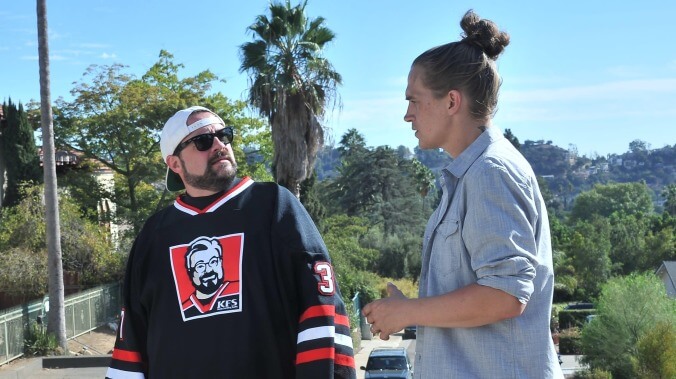The illusion is swiftly broken by an interrupting casting director, who informs Mewes (playing himself) of a misunderstanding: He’s supposed to be reading for the stoner buddy, not the intense leading role. Mewes the character is frustrated but not surprised; Mewes the filmmaker chases the self-deprecation with some self-flattery by having the casting director still tell him that he’s amazing—the best at what he usually does, essentially. Later, Kevin Smith (also playing himself) tells him he’s too sweet for the cutthroat world of Hollywood.
Smith also advises Mewes to check out a Matt Damon-recommended book on Method acting to help him dig into potential roles. After obtaining a copy of the rare tome from mysterious playboy Fernando (Jaime Camil), Mewes devours its contents, which the movie condenses into bits of numbered self-help-ish amorphisms, and comes up with a course of action: startle the casting director at his home in the middle of the night to prove his badass bona fides. Unsurprisingly, it does not go well. Improbably, it results in a gruesome sort-of-accident for which English actor and former soccer star Vinnie Jones receives the blame. Even less probably, Mewes receives a career boost from his association with prime suspect Jones.
Jones also plays himself, as Mewes’ sobriety buddy—and, though it’s not quite stated outright, a fellow stereotyped actor of unconventional origins. Madness In The Method makes this a motif by casting MMA fighter turned action star Gina Carano as Mewes’ live-in girlfriend, Carrie, and including fellow Clerks alum Brian O’Halloran as a sleazy but higher-profile version of himself. O’Halloran is making the transition to big-budget studio directing, and the mysterious, poorly defined book emboldens Mewes to pursue the leading role. He becomes equally desperate to maintain his career momentum and cover up his criminal activities.
Madness In The Method starts as an outskirts-of-Hollywood hangout comedy, with Mewes and Jones trading silly banter and Mewes suffering mild indignities in the guise of fan recognition (“Is the fat one nearby?” a real-life convenience store clerk excitedly asks him). But it lacks the scrappy texture of something like, well, Clerks; like a lot of contemporary low-budget movies, it’s all shiny but cheap-looking color-correction, resembling a YouTube music video doing a passable impression of professionalism.
Moreover, the filmmakers never get a handle on their version of Hollywood satire, specifically what it hints at by placing Mewes, Jones, and Carano together: how performers who unexpectedly become actors cope with industry bullshit. The movie sort of recognizes the absurdity of, say, Dean Cain popping up to insist that Brian O’Halloran’s next project is the talk of the town, but treats it more as a story convenience (and, weirder, a necessary excuse to employ Dean Cain) than a full-on comic conceit. Mewes and company also treat multiple throwaway lines from past Kevin Smith comedies as universally recognized catchphrases, suggesting a supplemental text that’s even more fans-only than the most insular entries in the View Askew universe.
Madness In The Method does give the real Mewes a chance to show how he can dial it down from Jay’s antics. His presence is steady enough that the scenes without him feel even more amateurish. But as bodies pile up and Mewes becomes more frazzled, the movie’s already-modest sense of gravitas slips away in favor of overacting, smirky violence, and a misplaced sense of amusement over men acting in any way effete. One late-movie confrontation between Mewes and Smith has an imitation of rawness, and the movie’s ending at least commits to the nastiness it flirts with for much of the 85 minutes leading up to it. Most of the time, Mewes’ follows in the later-period footsteps of his friend Smith, steering a what-the-hell production that’s less entertaining than the two buddies just talking.


 Keep scrolling for more great stories.
Keep scrolling for more great stories.
